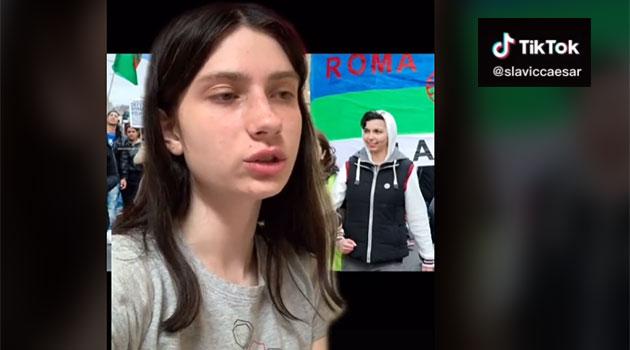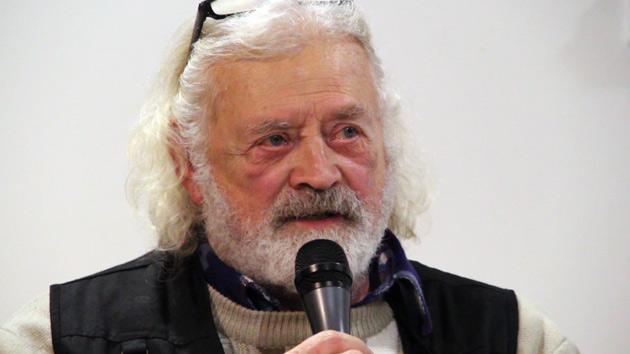Brooke Pavek, an American with Romani roots, has more than 700 000 social media followers

Brooke Pavek is a young American woman whose Romani father is from the Czech lands and whose Jewish mother is from Poland; she is proud of her roots and frequently speaks about them on social media, where more than 700 000 fans follow her, and she has become so popular among young people thanks to her brief, entertaining videos about history on TikTok that leading media outlets like the BBC or TIME magazine in the US have written about her. She has been making use of her platform to draw attention to the initiative called the.future.is.roma.
“It’s crazy,” Brooke posted to her Instagram about her unanticipated success in 2019. “At the beginning of the year [2019] I was rejected when I applied for the job of my dreams.”
“A couple of weeks later I began my TikTok and it never occurred to me what would happen,” she posted. According to her, she has been aware of her Romani identity since childhood thanks to her father and his family, but it made the biggest impact on her when her father brought her to the Czech lands, the place they hail from.
Brooke: It’s beautiful to be Romani
“Being Roma is beautiful,” Brooke says on the Facebook page the.future.is.roma. “The Roma are a strong and resilient people and there’s so much beauty in the culture.”
Brooke, who admires Julius Caesar and calls her Instagram and TikTok accounts Slaviccaesar, is not just a lover of history, but also a fiery activist for minority rights. On her Instagram and TikTok profiles, where she also has an account called Sapphiclemon for people with different sexual orientations, she fights in a fresh way for freedom for lesbians, as she is one herself.
“I cannot stay silent when the LGBT community in Poland continues to be attacked and oppressed more and more,” she has posted to Instagram. “I grew up with my Polish identity, Polish jokes and the Polish flag. Nowadays I am afraid to go back to the country my family comes from. My relatives died fighting for Poland. A large part of my ancestors were buried in mass graves and their ashes were scattered in places like Auschwitz. I couldn’t even go to Poland now without fearing attack if my girlfriend and I were to be there together. It’s difficult for me to imagine the pain of LGBT Poles living in that country.”
“I might make some Polish people angry, but I can’t change what I am. I cannot change the fact that I’m a Polish woman. I cannot change the fact that I’m LGBT,” she posted.
Brooke is decidedly not indifferent to the fate of Poland, nor is she indifferent to the fate of Jewish and Romani people, whose heavy history she frequently mentions on social media, where she often returns to the sad events and the genocide of the Second World War in her posts. “Let us never forget the six million Jewish people killed and that between 500 000 to a million Romani people were killed. We must never forget the families who disappeared, the gas chambers, and the murders. I will fight against antisemitism and antigypsyism to my last breath. This can never be allowed to happen again,” she has posted to Instgram.
How to capture a young audience
Brooke set up her TikTok account about history prior to graduating from high school, where her main concentration was history, and she used her notes as material for her videos where, frequently dressed in different historical costumes, she speaks in a creative, funny way about interesting episodes from history, whether that be Ancient Rome, the Second World War, or the French Revolution. She doesn’t just choose big subjects to discuss, but also different curiosities, such as when she describes the variety of torture methods used in the past, or speaks of Julius Caesar’s desire for the perfect haircut.
In short, Brooke knows how to capture a young audience – her 15-second videos are long enough to attract attention and short enough so people don’t start getting bored. This young woman, who loves Shakespeare in addition to history and recites her favorite poems on social media, frequently dedicates her posts to strong women.
In these posts, Brooke focuses on figures who managed to stand up to regimes or who fought in wars, such as Soviet women who fought during the Second World War or Las Adelitas, a group of women who fought in the Mexican uprising at the beginning of the 20th century, or artists like the Russian poet of Jewish origin Sophia Parnok and Polish musician Wanda Landowská. Brooke has a clear idea of what she wants to do with her future – once she completes her studies, she says she wants to become a history professor.
Her room can frequently be seen in the background of the videos she shares, decorated with three flags – a Czech flag, a Polish flag, and the LGBT rainbow flag – and not only is her enthusiasm for history apparent, it is clear how much awareness of her identity means to her. Her life philosophy can best be summarized by one of her recommendations to her followers: “Never be afraid to be yourself!”
